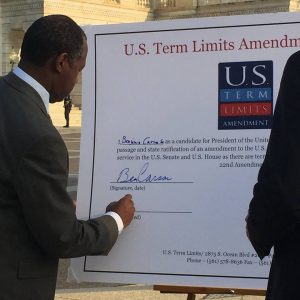
Washington, D.C. – U.S. Term Limits (USTL), the leader in the national movement to limit terms for elected officials, today commended Dr. Benjamin Carson for signing the U.S. Term Limits Presidential Pledge. By signing, Carson commits to advocate for congressional passage and state ratification of an amendment limiting the terms of U.S. representatives and senators.
USTL President Philip Blumel commented on Carson’s pledge, saying, “We applaud Dr. Carson for having the courage to make congressional term limits a priority of his campaign.”
“In making the transition from medicine to politics, Dr. Carson knows firsthand the need for new insights and perspectives in Washington,” Blumel added. “He agrees with three-quarters of Americans that Congress now lacks the common sense principles citizen legislators can deliver.”
The U.S. Term Limits Amendment Pledge is provided to every announced candidate for president. It reads, “I pledge to support congressional passage and state ratification of an amendment to the U.S. Constitution that would set term limits on service in the U.S. Senate and U.S. House, as there are term limits on the President, as enacted by the 22nd amendment.”
The U.S. Term Limits Constitutional Amendment has been introduced in both the U.S. Senate by Senator David Vitter (R-LA) and the House of Representatives by Representative Matt Salmon (R-AZ). While the president would not vote on or sign the amendment, his role as an advocate is a critical piece to advance any amendment through Congress.
Blumel noted, “Members of Congress have almost no objectivity on term limits, because they want to preserve their own careers. For this effort to be successful, we need a president who will call out Congress for not listening to the public on this issue.”
According to the last nationwide poll on term limits conducted by Gallup, the issue enjoys wide bi-partisan support. The poll showed that 75% of Americans support congressional term limits.
Gallup’s analysis states, “Republicans and independents are slightly more likely than Democrats to favor term limits; nevertheless, the vast majority of all party groups agree on the issue. Further, Gallup finds no generational differences in support for the proposal.”
The term limits amendment bills would require a two-thirds majority in the House and Senate, and ratification by 38 states in order to become part of the Constitution.